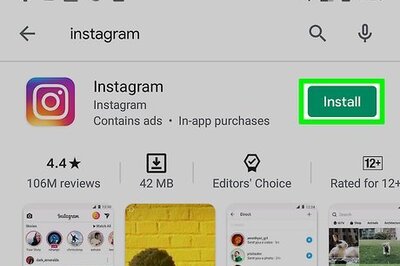
views
KOCHI: Is online banking safe? Taking a cue from the police after the first incident of phishing that occurred in Kochi in which an online fraudster transferred Rs 13.5 lakh from the account of a doctor, it has been confirmed that Internet banking is not 100 per cent safe, even after taking all precautions.According to the officials of the Hightech Cell of the state police, despite the efforts taken by banks and other organisations to make their websites secure, there is still one per cent chance of getting them hacked.“There is no doubt that all major organisations use high-standard security programmes to secure their online activities.But, you can’t sit back and presume that it will not be breached. Even the secret accounts of the US security agencies were hacked several times.So one must be cautious while dealing with online money transactions,” N Vinaya Kumaran Nair, assistant commissioner, High-tech Cell, said. According to Hightech Cell, all online users must be cautious as their personal details can be leaked out.“The only way to be safe from hacking and phishing is to use Internet responsibly. Since mobile banking has become common today, the users must take care of their mobile phones. Never store any personal or secret information in the mobile phone as this can be easily leaked. e-mail related scams are also very high, these days so never click on links that come with suspicious mails,” a High-tech official said.Hacking is carried out mainly to leak your secrets or money from the bank. The cyber crime, especially online frauds, are on the rise every year.“Every new technology can be used both in a constructive and destructive way. The phishing case reported in Kochi is the first of its kind. It also sends a message that people must be very careful while using Internet and mobile,” N Vinaya Kumaran Nair said.While Banking Online...■ While logging on to the website of the bank, make sure it is the genuine one. There are several bogus websites that looks similar to the original one. Links to these sites are usually sent through decoy mails. These dubious websites deliberately use a name or web address that is very similar to the real one.■Never attend e-mails that says your bank needs your account information updated. If attended, the information you enter, like your password, log-in name and PIN would reach the hands of hackers. Remember that banks and credit card companies usually will never e-mail you to confirm or update your personnel information ■Keep your computer virus free. Install anti-virus and update it regularly.There are Trojans that install keylogging software and capture user names and passwords ■Keep changing your passwords and PINs frequently.Most bank websites remind you to change them after a few days ■Never access your bank online from a public network, like a cyber cafe or wi-fi as they can easily hack into your personal accounts ■Do not give your mobile phone numbers while chatting over the Internet to avoid stalking. And do not lend mobiles either ■ Do not use or buy a used SIM card. Make sure your SIM card is bought and registered under your name with your permanent address ■Do not lend your mobile phone, and try to protect your phone with a password if the facility is available in the handset ■Take care when using your phone in public places - do not flash it around ■Make a note of the mobile’s serial number - you can find it by typing *#06# on your phone. The serial number can help track the mobile if it’s stolen or lost




















Comments
0 comment